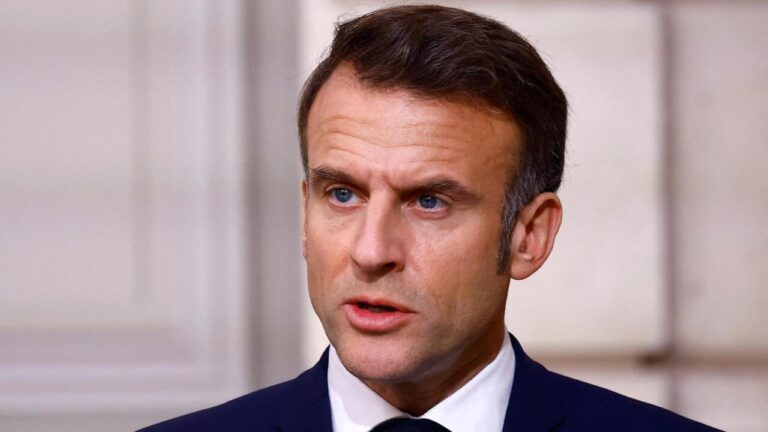In a political landscape increasingly dominated by polarization and populism, France finds itself at a critical crossroads as the spotlight once again turns to the far-right’s influence on governance. The recent developments surrounding Prime Minister ├ēlisabeth Borne’s leadership have thrust the country into a complex web of negotiations and power dynamics, where the persistent rise of far-right factions looms large. As the National Rally, led by Marine Le Pen, consolidates its position within the National Assembly, the implications for both BorneŌĆÖs government and the broader political future of France raise pressing questions. This article delves into the implications of this evolving power struggle, exploring the stakes for democracy, stability, and the very fabric of French society.
The Rising Influence of the Far Right in French Politics
The recent electoral landscape in France has given rise to a dramatic shift, with the far-right gaining unprecedented traction. This trend is marked by a series of strategic maneuvers that have positioned the National Rally, led by Marine Le Pen, as a formidable force within the political arena. A significant part of this influence stems from their ability to resonate with voters disillusioned by traditional parties. Key factors contributing to their rising prominence include:
- Economic Anxiety: Many voters are increasingly concerned about economic stability, prompting them to seek alternatives to mainstream parties.
- Immigration Stance: The far-right’s hardline policies on immigration have drawn supporters who feel that national identity is under threat.
- Public Safety Narratives: A robust discourse around crime and public safety has allowed the far-right to reclaim a sense of authority in policy discussions.
As France braces for upcoming legislative challenges, the far-rightŌĆÖs sway over government stability cannot be overlooked. Recent polls indicate an alarming shift in voter sentiment, with an increasing number of constituents prepared to support far-right candidates who promise decisive action on immigration and security. To illustrate this shift, consider the following breakdown of voter intentions across the political spectrum:
| Political Group | Voter Support (%) |
|---|---|
| National Rally | 30% |
| La R├®publique En Marche | 25% |
| Les R├®publicains | 15% |
| Other Parties | 30% |
This table highlights the growing acceptance of far-right policies among the electorate, indicating a potential recalibration of the political landscape in favor of those willing to adopt these contentious positions. As politicians on all sides strategize their next moves, the far-rightŌĆÖs influence may very well dictate the future direction of French governance.
Navigating Legislative Challenges Amidst Political Polarization
As France grapples with the specter of political polarization, the embattled position of the prime minister serves as a vivid illustration of the complexities involved in legislative governance. With the far right gaining momentum, decisions once considered straightforward now demand intricate negotiations, often leading to uncertainty over the passage of critical reforms. The dynamic is shaped by an increasingly fragmented parliamentary landscape, where the balance of power teeters precariously between mainstream parties and their far-right counterparts, who wield significant influence over legislative outcomes.
Stakeholders are left to ponder several key considerations:
- Impact of Extremism: How far-right positions shape mainstream policy agendas.
- Coalition Governance: The challenges of forging alliances in a fragmented political arena.
- Public Sentiment: How citizen responses influence legislative priorities and party strategies.
The future legislative landscape appears contingent not only on the prime minister’s ability to navigate these currents but also on the broader societal consensus surrounding contentious issues. As discontent rises, the precariousness of relying on potentially volatile political alliances is underscored, setting the stage for an evolving discourse on governance and representation.
Strategies for the Prime Minister to Regain Stability
In the wake of increasing pressure from the far-right factions, the Prime Minister must adopt a multifaceted approach to restore stability in the government. This can be achieved through a combination of policy adjustments and public engagement strategies. Key steps could include:
- Revising Immigration Policies: Addressing the concerns of the electorate by implementing fair and transparent immigration reforms.
- Civic Engagement Initiatives: Promoting community dialogues that create a platform for citizens to voice their concerns, thereby countering far-right narratives.
- Collaboration with Center-Right Parties: Forming strategic alliances to present a united front against extremist ideologies.
Moreover, the government needs to emphasize social cohesion and tackle economic inequalities that fuel dissent. A focus on education and job creation will be pivotal in addressing the root causes of unrest. Suggested measures include:
| Strategy | Expected Outcome |
|---|---|
| Investing in vocational training | Reduce unemployment rates |
| Strengthening social safety nets | Enhance public trust |
| Support for small businesses | Stimulate local economies |
By implementing these strategies, the Prime Minister will not only counteract growing far-right influence but also foster a more resilient democratic framework, encouraging citizens to rally around a common vision for a stable and inclusive France.
Public Sentiment and Its Impact on Future Governance
As France grapples with a shifting political landscape, the influence of public sentiment on governance has reached a critical juncture. The far-right party, emboldened by recent electoral gains, has positioned itself as a key player in shaping governmental policies and priorities. Opinion polls indicate a significant segment of the electorate aligns with their viewpoints on security and immigration, revealing a society increasingly polarized over these pressing issues. Citizens are increasingly demanding action, which may compel the current government to reassess its approach to meet public expectations. This demand for change highlights the potential instability that can arise when the voices of a discontented populace are amplified in the political arena.
Moreover, the growing traction of far-right sentiments may signal a broader transformation in France’s political discourse. Key factors influencing public opinion include:
- Economic anxiety and job security
- Perceptions of national identity
- Concerns over crime and safety
As these issues gain prominence, traditional parties may find themselves under pressure to adapt their platforms or risk losing relevance. Governing in such an environment necessitates a delicate balance; leaders must navigate the competing demands of an electorate that is experiencing a paradigm shift in its political affiliations and expectations. The implications for future governance are profound, suggesting that leaders must not only listen but also respond adeptly to the changing sentiments of the electorate.
Closing Remarks
In conclusion, the precarious position of France’s Prime Minister underscores the significant influence the far-right now wields in shaping the nationŌĆÖs political landscape. As tensions simmer and electoral strategies come to the forefront, the stakes could not be higher for both the government and its opposition. Observers will be closely monitoring how this dynamic unfolds in the coming months, as the ability to navigate the challenges posed by the far-right could redefine not only the current administration but also the future of French politics. With the political climate in constant flux, one thing is certain: the far-right’s role will be pivotal in determining the fate of the nation and its leadership.




